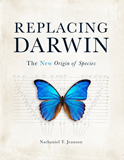
Church of England Offers Posthumous Apology to Darwin
As part of the celebration of the 200th anniversary of Darwin’s birth, the Church of England is issuing an apology of sorts to Darwin for its previous “anti-evolutionary fervour.” The response from Darwin’s descendants? Thanks, but no thanks.
News Source
- The Telegraph: “Church to Make Posthumous Apology to Charles Darwin”
The informal apology appears on a special Church of England website set up to commemorate Darwin, titled “On the Origin of Darwin.” The site includes an introduction, welcome message, some history, and upcoming events, but at the center of the news is an essay by Malcolm Brown, the church’s director of mission and public affairs, titled “Good Religion Needs Good Science.” In it, Brown writes:
Subsequent generations have built on Darwin’s work but have not significantly undermined his fundamental theory of natural selection. There is nothing here that contradicts Christian teaching. . . . Christians believe that God became incarnate as a human being in the person of Jesus and thereby demonstrated God’s especial love for humanity. But how can that special relationship be undermined just because we develop a different understanding of the processes by which humanity came to be? . . . Charles Darwin: 200 years from your birth, the Church of England owes you an apology for misunderstanding you and, by getting our first reaction wrong, encouraging others to misunderstand you still.
Widely reported in response were the words of Andrew Darwin, who harshly rejected the apology as “pointless.” The great great grandson of Charles reportedly said, “Why bother? When an apology is made after 200 years, it’s not so much to right a wrong, but to make the person or organisation making the apology feel better.” (Interestingly, the Vatican made it clear this week that it wouldn’t bother apologizing to Darwin, at least partly because Archbishop Gianfranco Ravasi, the Vatican’s culture minister, stated that Darwin’s theories were “never condemned by the Catholic Church nor was his book ever banned.”)
Our view is that Brown seems to miss the point that the 19th century Church’s “attacks” on Darwin were, by and large, based on legitimate intellectual disagreement, itself rooted in different views on the authority of Genesis—in other words, similar to the conflict over Darwin today. The Church of England (and many other denominations) has, over time, given in to Darwin’s views not because the conflict between Genesis and the Origin of Species went away, but because many Christians conceded the authority of Genesis. Genesis is the book of the Bible which presents the foundational history for all Christian doctrine (especially the gospel message—see Genesis 3), and thus it must be upheld as accurate and authoritative.
Using observational science, we can confirm that Genesis is totally accurate.
Brown also writes in his essay, “Whilst Christians believe that the Bible contains all that we need to know to be saved from our sins, they do not claim that it is a compendium of all knowledge.” We agree; for instance, the Bible simply does not contain a report on how many went through AiG’s Creation Museum last week. Yet this idea is sometimes popularly misconstrued as indicating that any “knowledge” outside the Bible must somehow trump even when there is clear scriptural teaching, as if the biblical account either doesn’t exist or doesn’t matter on any but metaphysical planes. But the origins debate centers on how life came to be, a one-time prospect that science can’t experimentally repeat. One must accept, by faith, either the historical account in Genesis or some other historical account, even one written by modern naturalistic scientists. Biblical creationists point out, however, that using observational science, we can confirm that Genesis is totally accurate.
Furthermore, despite claims of how the church may have somehow offended Darwin (who was probably an atheist, by the way, or at least an agnostic at the end), he is nonetheless buried in Westminster Abbey, the most famous church in England. In fact, sad as it is to say, the 20th century church more than made up for the disagreements with Darwin of the 19th century when it bought into evolutionary theory and elevated it above the Genesis account. The ultimate result—an increasing rejection of not just Genesis, but the whole Bible—may shape the 21st century church.
Further Reading
For More Information: Get Answers
Remember, if you see a news story that might merit some attention, let us know about it! (Note: if the story originates from the Associated Press, FOX News, MSNBC, the New York Times, or another major national media outlet, we will most likely have already heard about it.) And thanks to all of our readers who have submitted great news tips to us. If you didn’t catch all the latest News to Know, why not take a look to see what you’ve missed?
(Please note that links will take you directly to the source. Answers in Genesis is not responsible for content on the websites to which we refer. For more information, please see our Privacy Policy.)
Recommended Resources

Answers in Genesis is an apologetics ministry, dedicated to helping Christians defend their faith and proclaim the good news of Jesus Christ.
- Customer Service 800.778.3390
- © 2024 Answers in Genesis







